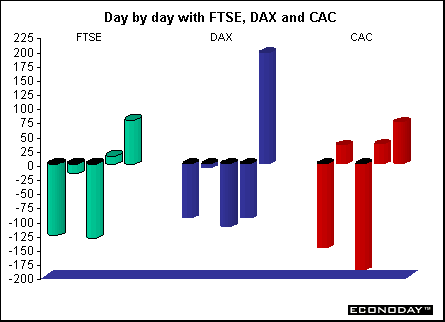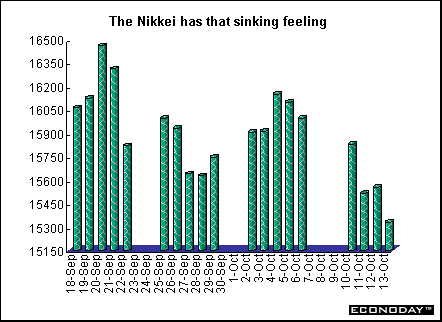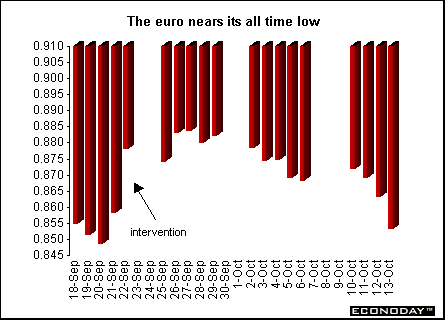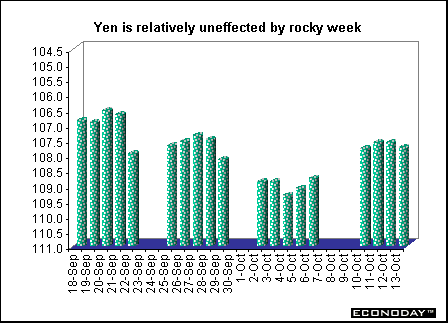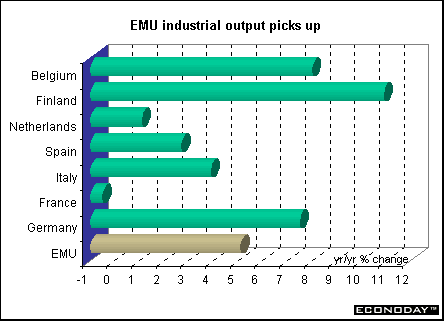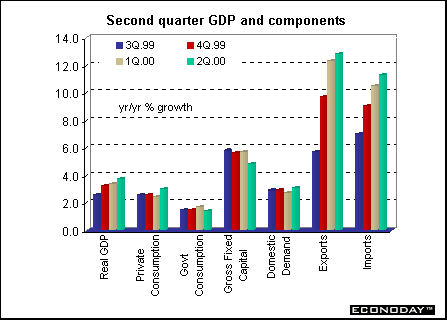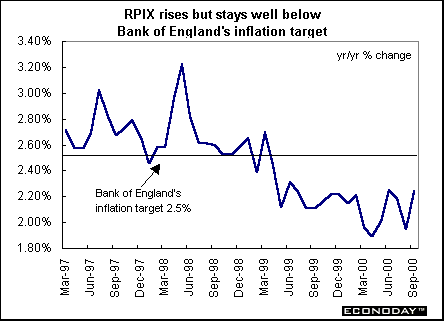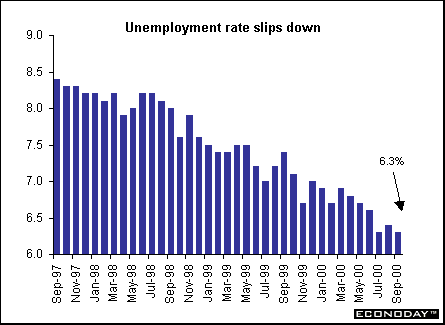| Previous Articles |
|
Overseas markets shiver However, Friday was another day. Though Asian markets sank in reaction to Thursday's news and market debacle, European and American investors had time to reflect on the bad news - and decided that they had overreacted. The markets soared, regaining a good part of the week's losses. But in sum, no index escaped unscathed last week. Europe and the Americas took it on the chin, and because of the time zones, Asia missed the Friday rally.
Japanese and Canadian markets were closed on Monday. Europe and Britain High oil prices and profit warnings - especially since the beginning of September - combined once again to hit stock prices. The chart below illustrates the indexes' volatility on a day to day basis. The week started poorly as imported worries afflicted equities. Investors became pessimistic about technology, media and telecommunications stocks as news crossing the Atlantic from west to east became exceedingly negative. Earnings warnings had depressed the Nasdaq and took other TNT stocks with it. In Britain, news that inflation had picked up in September (see indicator scoreboard below) did not help investors' attitudes. Analysts were trying to figure out just how much of the inflation pressure really was due to gasoline prices. This in turn, revived interest rate worries, even though price increases (according to the Bank of England's measure) remained comfortably below the 2.5 percent inflation target. The FTSE 100 ended the week at 6209.60, down 181.60 points or 2.84 percent. On the year the FTSE has lost 10.4 percent.
European technology stocks also were battered by further bad news from the United States. The banking sector suffered from rumors of big losses on junk bond dealings, which added to the downward pressures. Despite recent losses, the Paris CAC is up 1.78 percent on the year. But last week the index closed at 6064.21, down 194.20 points or 3.10 percent. The Frankfurt DAX shed 115.09 points or 1.70 percent to end the week at 6661.30. The DAX is down 4.27 percent since the beginning of the year. Asia
On Friday, Asian stocks fell, mirroring the plummeting indexes elsewhere, on concern that escalating violence in the Middle East will further boost oil prices and slow both growth and corporate profits. Other than Australia, which is about even for the year, the Japan Nikkei has dropped 19 percent; the Hong Kong Hang Seng, 13.45 percent; the Singapore Strait, 25 percent and the South Korean Kospi has lost almost half its value, down 49 percent since the beginning of 2000. Currencies
The currency markets are concerned with inflationary trends and higher crude oil prices that are hitting Europe. Crude is priced in U.S. dollars, making it even more expensive in Europe because of the euro's low value. Continued higher growth in the United States is also a negative for the euro. And merger and acquisition activity has funds flowing to the west across the Atlantic. The yen traded in a relatively narrow range during the week. Ironically, it was supported by the largest corporate bankruptcy in Japanese history amid talk the company would have to liquidate foreign holdings and repatriate yen. Also underpinning the yen was a surprising 26.6 percent surge in August machinery orders, which highlights the case that capital expenditures are the one bright spot in the Japanese economy.
Indicator scoreboard
Revised second quarter gross domestic product remained at 0.9 percent, but slipped to 3.7 percent when compared with last year. Downward revisions to private consumption and inventory change were offset by upward revisions to investment and net exports.
Germany - Final September consumer price index jumped 0.5 percent and 2.5 percent when compared with last year. This is the highest since December 1994. Final seasonally adjusted consumer prices for the six months to September rose at an annualized rate of 2.8 percent, compared with 1.7 percent in August. September seasonally adjusted prices rose 0.7 percent on the month and were up 2.5 percent on the year. August unadjusted trade surplus was DM 4.0 billion, down from DM10.3 billion in July. Imports rose faster than exports, due in large part to the increasing cost of crude oil and imported petroleum products. Exports continue to grow helped by the weak euro, but at a slower pace. Imports rose 26.3 percent while exports jumped 21.8 percent when compared with last year. August pan-German industrial production rose 1.1 percent. Manufacturing output rose 1.2 percent and construction sectors climbed 2.7 percent. East German output was down 2.6 percent while production rose 1.4 percent in west Germany. France - September consumer prices surged 0.6 percent and 2.3 percent when compared with last year. Most of the increase was due to the 4.6 percent jump in energy prices. Excluding energy, the unadjusted CPI was up 0.2 percent on the month and was 1.0 percent higher on the year. The seasonally adjusted CPI rose 0.5 percent on the month and 2.2 percent when compared with last year. Core inflation, which excludes administered prices and volatile sectors like food and energy, was flat on the month but was up 1.3 percent on the year. Spain - September consumer prices rose 0.3 percent and 2.7 percent when compared with last year. The jump was due entirely to higher oil prices. Consumer prices excluding energy products and non-processed food, was flat on the month and rose 2.8 percent on the year. Britain - September seasonally adjusted producer input prices jumped 2.8 percent on the month and were up 14.3 percent on the year. Again, the increase was almost entirely because of higher crude oil prices. On a non-seasonally adjusted basis, crude oil was up 17.1 percent on the month and 71.5 percent on the year. In addition to crude oil, imported metals and pulp and paper prices also pushed up the input price index. September non-seasonally adjusted output prices were up 0.3 percent on the month and 2.5 percent on the year. The seasonally adjusted core measure of output prices (excluding food, beverages, tobacco and petroleum) was up 0.2 percent on the month and 1.2 percent on the year. September retail price index excluding mortgage interest payments (RPIX) rose 0.8 percent and 2.2 percent when compared with last year. The retail price index RPI was up 0.7 percent on the month and up 3.3 percent on the year. The retail price index excluding both mortgage interest payments and indirect taxes (RPIY) rose 0.8 percent on the month and 2.0 percent on the year. The largest upward pressures came from rising motoring costs because gasoline and oil prices.
Asia August seasonally adjusted private sector machinery orders, excluding volatile orders for ships and from power companies, rose 26.6 percent after falling 11.7 percent in July. Unadjusted machine orders rose 45.8 percent on the year. Total machine orders rose 12.5 percent on the month while manufacturing rose 10.0 percent and non-manufacturing rose a core 40.7 percent. Government machine orders rose 8.3 percent on the month. August seasonally adjusted current account surplus widened for the first time in four months, as investors earned more from foreign bonds and stocks, which pay higher yields and dividends than Japanese securities. The surplus widened 9.9 percent and 24.1 percent when compared with last year. Most of the increase stemmed from the income account surplus, which tracks the flow of dividends and interest payments in and out of Japan. Australia - September unemployment rate fell to 6.3 percent, matching a ten year low reached in July. It fell primarily because of the Olympics as fewer people looked for work. Employment dropped 30,500 jobs, most of them part time, as activity in industries not associated with the Olympic Games slowed and workers stayed home to watch events on TV. However, the economy created 9,700 full time jobs but was not enough to offset the loss of 40,200 part time positions.
BOTTOM LINE
Release dates are subject
to change. |
|||||||||||||||||||||||||||||||||||||||||||||||||||||||||||||||||||||||||||||||||||||||||||||||||||||||||||||||||||||||||||||||||||||||||||||||||||||||||||||||||||||||||||||||||||||||||||||||||||||||||||||
